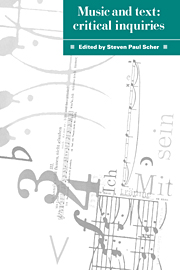Book contents
- Frontmatter
- Contents
- List of figures
- List of contributors
- Preface
- Acknowledgments
- Part I Institutional dimensions and the contexts of listening
- Part II Literary models for musical understanding: music, lyric, narrative, and metaphor
- 4 Lyrical modes
- 5 Origins of modernism: musical structures and narrative forms
- 6 Metaphorical modes in nineteenth-century music criticism: image, narrative, and idea
- 7 Narrative archetypes and Mahler's Ninth Symphony
- Part III Representation, analysis, and semiotics
- Part IV Gender and convention
- Index
4 - Lyrical modes
Published online by Cambridge University Press: 04 September 2009
- Frontmatter
- Contents
- List of figures
- List of contributors
- Preface
- Acknowledgments
- Part I Institutional dimensions and the contexts of listening
- Part II Literary models for musical understanding: music, lyric, narrative, and metaphor
- 4 Lyrical modes
- 5 Origins of modernism: musical structures and narrative forms
- 6 Metaphorical modes in nineteenth-century music criticism: image, narrative, and idea
- 7 Narrative archetypes and Mahler's Ninth Symphony
- Part III Representation, analysis, and semiotics
- Part IV Gender and convention
- Index
Summary
This essay concerns the way the term “mode” is used in literary criticism, and is conceived as lying somewhere between two areas pertinent to this volume: literary theory as a model for music criticism and genre theories in literature and music. It is unlikely that what I say will be a model for the analysis and interpretation of music, but I hope that it will interest interpreters of music. As for genre theory, the concept of mode enters literary discourse partly as a way of dealing with certain impasses that arise from thinking in strictly generic terms, and it may be that some real analogies with musical analysis will be evident. Whatever these may be, I will not try to say anything about the musical term “mode.” Having worked my way through Harold Powers' article in the New Grove Dictionary of Music and Musicians (Vol. 12, pp. 376–450), I know enough to leave to others the discovery of possible relations and analogies.
In literary studies, the theory of genres often seems a whirligig of reifying and hair-splitting, but in work of the past few decades there is something of a shared sense of what is meant by a genre. Most theorists and critics do not now use the term for the ultimate categories – the most familiar of which are narrative, drama, and lyric – which Goethe called Naturformen and which include all that we mean by literature. Genres are now generally agreed to be historical phenomena, and there is a tendency to think of them as well demarcated, both historically and aesthetically.
Information
- Type
- Chapter
- Information
- Music and TextCritical Inquiries, pp. 59 - 74Publisher: Cambridge University PressPrint publication year: 1992
Accessibility standard: Unknown
Why this information is here
This section outlines the accessibility features of this content - including support for screen readers, full keyboard navigation and high-contrast display options. This may not be relevant for you.Accessibility Information
- 2
- Cited by
